TIMELINE: HOW BRUCE PASCOE BECAME ABORIGINAL. OR NOT
Bruce Pascoe, author of the best-seller Dark Emu, has publicly claimed to be Aboriginal since a critic marked him down for being white. Here is a chronology of his transformation into an Aboriginal. How can ABC journalists still defend him? UPDATE: This has been extensively updated with startling new information about Bruce Pascoe's 1993 search.
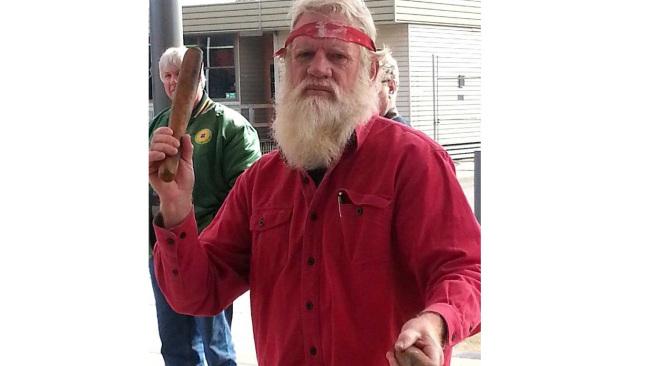
(NOTE: this timeline has been extensively updated with extraordinary new information about Bruce Pascoe's search in 1993 and 1996 for his elusive "Aboriginal great-grandmother".)
Bruce Pascoe, author of the best-seller Dark Emu, has publicly claimed to be Aboriginal since a critic marked him down for being white.
He has since won a NSW Premier's literary award for best Indigenous writer, and is a professor in the Aboriginal studies department of the University of Technology, Sydney. The ABC is now about to run a two-part documentary featuring Pascoe and his claims that Aborigines were settled farmers living in "towns" of "1000 people".
Here is a chronology of Pascoe's astonishing transformation into an Aboriginal - against all the evidence and despite objections from Aboriginal groups.
1988
Pascoe publishes his first novel, Fox, about a fugitive who thought he was white, now searching for his Aboriginal roots. Pascoe in his biography in the book does not say he is Aboriginal himself:
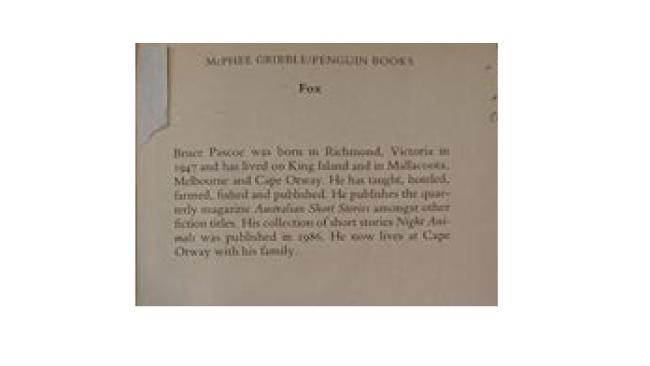
1988
A Canberra Times reviewer of Pascoe's first novel says it would have been better had Pascoe been Aboriginal:
Pascoe is, after all, imagining the psyche of an Aboriginal person; and it is not possible for him to convey all that the concept of ‘my people’ would mean to, say, Colin Johnson [sic. Johnson was later exposed as non-Aboriginal]…
He writes as a humane, informed liberal, but as a white man as well.
Circa late 1980s
From a profile this year of Pascoe, this claim:
By the time he was 40, he had fully identified as Koori.
Which suggests 1987. Note: this is a claim made this year.
1993
But Pascoe in 1993 is still searching for an allegedly Aboriginal great-grandmother, and writes a letter to the Koori Mail (July 14, 1993):
Calling Sarah Matthews
I have been looking for my Koori family for a number of years without much success. My great grandmother Sarah Matthews was born at Dudley, South Gippsland on or around 1848 and she gave birth to my grandmother, Gertrude Cowland. at Pleasant Creek Victoria in 1875. Sarah Matthews may have come to South Gippsland on a sealing vessel. If anyone has any knowledge of this family, I would be very grateful. I am trying to let my children know about their people and we would all like to be able to join our family group again. Bruce Pascoe Apollo Bay, Victoria
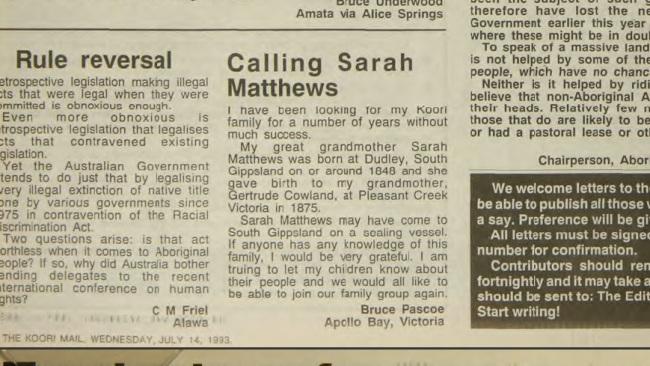
But genealogist Jan Holland, through some great digging for Dark Emu Exposed, has found that Matthews was born not in Dudley, South Gippsland, but Dudley, England. Here is the entry from the marriage register in Pleasant Creek, 1874:
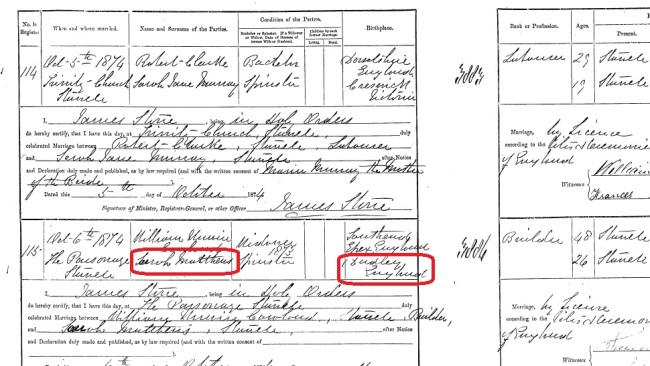
Nor did Matthews arrive in South Gippsland on a sealing vessel. She came with her family on the ship Burlington, landing in Fremantle on April 8, 1863. Here is the entry in the ship's records:
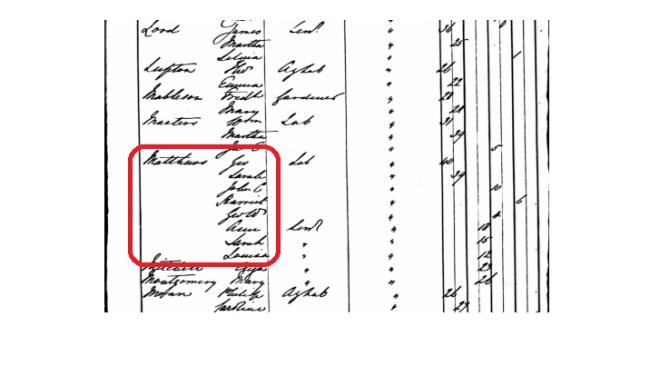
1996
Pascoe still can't find his Aboriginal great-grandmother, and sends another letter to the Koori Mail (November 6, 1996), misspelling her name, suggesting she lived on Aboriginal missions and had a baby who became one of the so-called Stolen Generations:
The librarian in charge of family archives at the Institute of Aboriginal and Torres Strait Islander Studies (IATSIS) has received a request for information about Sarah Mathews from an Aboriginal person in New South Wales. I do not know all the details of the application, but Sarah Mathews was my great grandmother and was born in South Gippsland, Victoria (Bunurong country) about 1845-47. She married in Ballarat in 1875 and may have spent time at Cummererugunja and Ebenezer Mission. Her daughter was taken from her as an infant and she then moved to the Horsham area, possibly Ebenezer. W e are trying to find more members of our family and it seems likely that w e are related to the person w ho made the inquiry to IATSIS. We would love to hear from that person. Please write to me at P O Box 42, Apollo Bay, 3233 or ring (reverse charges) xxxxxxxx My family is very anxious to meet all branches of our family. BRUCE PASCOE Apollo Bay, Victoria
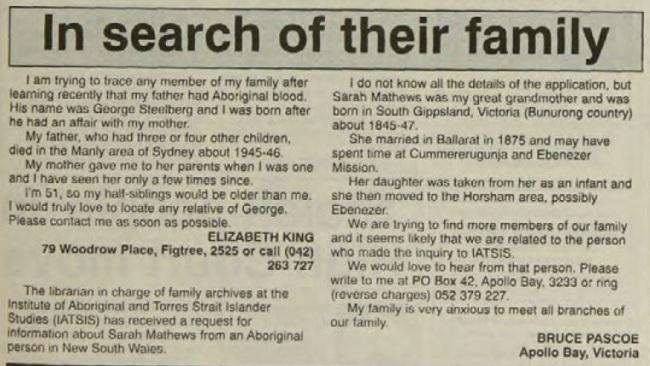
2007
But Pascoe still implies that his Aboriginality comes from a great grandmother:
I’m not very black. I’m sure that in years to come the Aboriginal community will be under pressure from bureaucracies to exclude people whose heritage is from a great-grandmother who did everything she could to become white, to merge with the master class.
2007
Pascoe says his Aboriginal ancestor was a great-grandmother on his mother's side - like Sarah Matthews:
Mine is only a remote Aboriginal heritage, going back to my mother's grandmother.
[Genealogical records recently found by a genealogist on dark-emu-exposed.org suggest his mother's grandmothers were a Mrs Smith, who never left England, and Sarah Matthew, who was born in England. I have asked Pascoe to tell me if and where they are wrong, but he won't.]
2008
Pascoe says his great-grandmother was Aboriginal from a tribe bordering the Wathaurong of Geelong and Colac (presumably the Boonwurrung, or Bunurong):
My great-grandmother adopted a new identity. …. It was quite common between 1840 and 1920 for young Victorian women to change their identities.... When I decided to teach myself my great grandmother's language I found a list of thirteen words. I turned to the language of the neighbouring Wathaurong and began to learn it and use it with my family.
2010:
Pascoe publishes a book about his mother, Gloria, who'd died six years earlier and co-wrote it. His mother does not describe herself as Aboriginal and says her son only discovered an Aboriginal connection after his father died in 1989, but Pascoe adds that this connection was on his father's side:
My cousin Barbara and I continue to search the records. Some of the information has turned out to be incorrect but new material has also been found. Mum was convinced of a Tasmanian connection on Dad’s side to and we are searching that line at the moment.
2012
Pascoe admits his "Aboriginal ancestor" - his great-grandmother? - was actually English:
My cousin had discovered the woman we thought was our Aboriginal ancestor was, in fact, born in England.
Date unclear
In an interview with Pascoe still published by the Victorian Curriculum and Assessment Authority as a resource for students, Pascoe says his great-grandmother actually herself spoke the language of Wathaurong:
I began reclaiming the Wathaurong Language... . It does my soul good to go back and talk words that my great-grandmother would have spoken.
2014
Pascoe finds more Aboriginal relatives "all over the country":
It’s just really telling that so many of the family friends were Aboriginal families and were always in association, living in the streets with Aboriginal people and, which you could account for from living in poverty, but there must have been an element of choice there as well. We’re still searching for family, you know, we’re finding them all over the country.
2016
Pascoe says the white side of his family comes from Lockhart River in Queensland:
And part of my family, the white side of my Pascoe family, come from Lockhart River.
2016
Pascoe turns his white ancestors at Lockhart River into Aborigines, and claims to belong to Aborigines from South Australia to Queensland:
I'm proud of my heritage. All my heritage... We have Aboriginal family from both sides from Moonta in South Australia to Lockhart River in Queensland.
2016
In an interview in The Guardian, Pascoe claims membership of three more tribes from three more states:
(Bruce says that he) has a “complex” racial background, which includes Bunurong (south-central Victoria), Yuin (NSW south coast) and Tasmanian Aboriginal, as well as ancestry from Cornwall in the UK.
[In fact, genealogical records suggest all his ancestors came from England, and only a few specifically from Cornwall.]
2019
Pascoe again claims membership of three tribes:
I'm a Yuin, Bunurong [Boonwurrung] and Tasmanian man.
[Aborigines from all three tribes or areas deny Pascoe's claims.]
2019
Pascoe again suggest his Aboriginal descent is from his mother's side:
His mother’s brother sometimes alluded to their Aboriginal ancestry but Pascoe didn’t begin investigating it in earnest until he was in his early 30s...
[That means before he published Fox, in which he does not describe himself as of Aboriginal descent.]
2019
Pascoe claims to have gone through some sort of initiation or acculturation ceremony with the Yuin of NSW:
…he was summoned to a meeting with.. a Yuin elder, arriving to find himself at a cultural ceremony…the beginning of his complete acculturation into indigenous lore, although Pascoe again declines to elaborate. “This is an honour but not something we talk about, nor do we point to the marks,” he says, adding that he prefers not to use the term “initiated” because of its capacity to be overdramatised.
2019
2019
Pascoe seems to suggest he's Aboriginal because of where he's born and chooses to live. He also asserts claims to four tribes:
Yeah. I was born on Bunurong country. Lived on Yuin land. But we’ve also got that Tasmanian connection, also a South Australian connection as well. You start following the family line and it spreads out around you.
November 29, 2019
After I questioned his Aboriginality, Pascoe claimed he had birth certificates to prove it, but will not release them:
I’ve always said that my Aboriginal heritage is a distant one. I’ve got birth certificates to confirm it. I’m not going to engage at such a petty level. There are more important things to do.
November 30, 2019
But the Saturday Paper says Pascoe's relatives are now in a "mournful" search of "libraries around the country to find the name of their Aboriginal ancestor."
Looking for family has taken on a mournful quality this week, as Pascoe’s kin went to libraries around the country to find the name of their Aboriginal ancestor. But how to proceed, one must ask, when so much of their story and the story of a people has been destroyed to protect the last excuse for colonisation?
So let's sum up.
Pascoe did not publicly claim he was Aboriginal until after a critic said his novel would be better if he did.
Since then he has claimed his great-grandmother on his mother's side was Aboriginal, only to later say she was English (presuming he was referring to the same person).
Despite that, he has gone on to claim links with at least six Aboriginal tribes from five states - the Bunurong or Boonwurrung of south-central Victoria, the Yuin of the NSW south coast, Tasmanian Aborigines, the Wathaurong of Colac, Aborigines from Moonta in South Australia and Aborigines from Lockhart River in Queensland. Aborigines dispute his claims and genealogical records suggest his ancestors are all originally English. When challenged, Pascoe refused to respond to me or to produce birth certificates he claims support his Aboriginality.
Why on earth are so many journalists on the ABC still defending Pascoe and not asking the most basic questions about his wildly improbable claims?
This is absolutely extraordinary. The most startling proof that facts no longer count. The myth is all, on the ABC.
